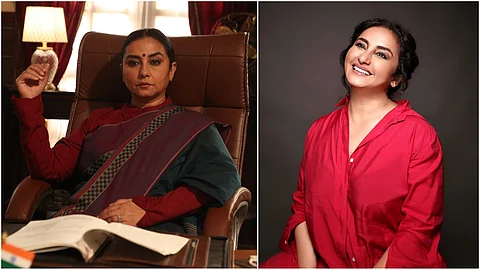

Mayasabha is Divya Dutta’s first Telugu project in her 32-year career. It’s a life-coming-full-circle moment for the acclaimed actor. Divya recalls receiving many Telugu projects early on in her career, which she couldn’t take up. “I just got too busy with work in Mumbai. Years later, I did one Tamil and one Malayalam film each, but Telugu never happened again,” she adds.
In Mayasabha, Divya Dutta plays a powerful politician figure named Ira, who appears to be inspired by Indira Gandhi. Divya clarifies that everything has been fictionalised for the series. She notes, “It is director Deva Katta’s vision. He saw Ira as a powerful Bengali woman who must have her say wherever it needs to be. There are amazing nuances to this role; we would often discuss the role’s tonality, and he gave it his all. I was just holding his hand and following where he went.”
Talking about the upcoming series, which deals with the political rivalry of two prominent leaders, Divya says, “It’s a very intriguing political scenario. When I watched the trailer at the launch on Thursday, I felt like watching the show right away. That drama just pulls you in.”
Besides sharing screenspace with the leads Chaitanya Rao and Aadhi Pinisetty, Divya will also be seen along with veterans like Nasser and Saikumar. Recalling the shooting experience, Divya says, “Initially, I went to the sets with a little inhibition, considering I didn’t know anybody. But I was welcomed so beautifully, and it was absolute fun on the sets. Both Aadhi and Chaitanya became friends. I have just one scene with Nasser sir, but I was so excited about it and wished there were more scenes.”
Before Divya rose to prominence with films like Veer Zaara and Delhi 6, among others, there were a couple of years where the actor struggled to carve a niche for herself. When asked if she ever looks back at her earlier works from the 90s, Divya remembers watching a meme from one of her early films, Raja ki Aayegi Baraat, which she recreated for Bandish Bandits promotions. “It’s nice to peek in the past once in a while, to see how you were different, as a process of self-observation. You think, ‘Oh, this is how I acted? That was nice, do I still do it this way?’ Sometimes you also laugh at some of the things, but you keep learning and take it all in your stride.”
When pointed out the possibility that the 90s were difficult times for unconventional actors like her, Divya quickly responds, “I also feel it’s your own doing sometimes. Not everyone is waiting with a delicious platter for you. You have to tell people, ‘I am hungry; this is the kind of food I want.’ Nobody is out there to promote you, so you have to push yourself.”
Divya goes on to recall how a lot of hard work went into making those roles, which caught people’s attention, noticeable. “It’s not like they were all author-backed roles. You have to put that effort to embellish those roles, and to make people go, ‘who is this?’ Also, these were times when there was no OTT, and when makers didn’t know where to place me,” she reflects.
At the same time, Divya acknowledges her collaborators, like Rakeysh Om Prakash and Aditya Chopra, for being part of this process. “My roles in Veer Zaara, Badlaapur, or Delhi 6 were kickass despite being roles that the film didn't always revolve around. Still, they made people say, ‘wo role achcha tha.’ I have to thank Yash Uncle and Adi, who sat with me to make the part extra special. Same for Delhi 6 and Bhaag Milkha Bhaag — there was something special about them. Whatever number of scenes there were, they were magical.”
Even though she has been incredibly busy in the past 3-4 years, the Bandish Bandits actor states that it’s important to take small breaks occasionally. “One must step back and gauge what you want and need. It's important to let life happen to you. There is this brilliant concept called nothingness; it’s difficult to achieve that.”
Divya also asserts that whether they want it or not, an actor is always on the job. “We keep observing people around us, since one never knows what one can use for a role. I watch people; for me, that is more of cinema. Also, as an actor, you don’t disconnect from a situation. I will understand a situation as Divya, as well as an actor, developing a backstory in my head, and that’s part of the syllabus for every actor.”
The actor is grateful for the OTT boom, while taking cognisance of the major ecosystem changes since its inception 8-9 years ago. She says, “There are two kinds of makers anywhere — those who make the trend and those who follow it. There are great stories being told right now, be it Kohraa or Panchayat, which are not necessarily lead by stars. But even in OTT, the star system has made inroads now. ‘First bring a star, then tell the story,’ the streamers say. How is it different then?”
Divya reinstates that OTT is an actor’s medium and that it should stick to the mode where actors who are suitable for the part continue to headline projects. “The way OTT started was magical. I hope it returns to that space,” she concludes.